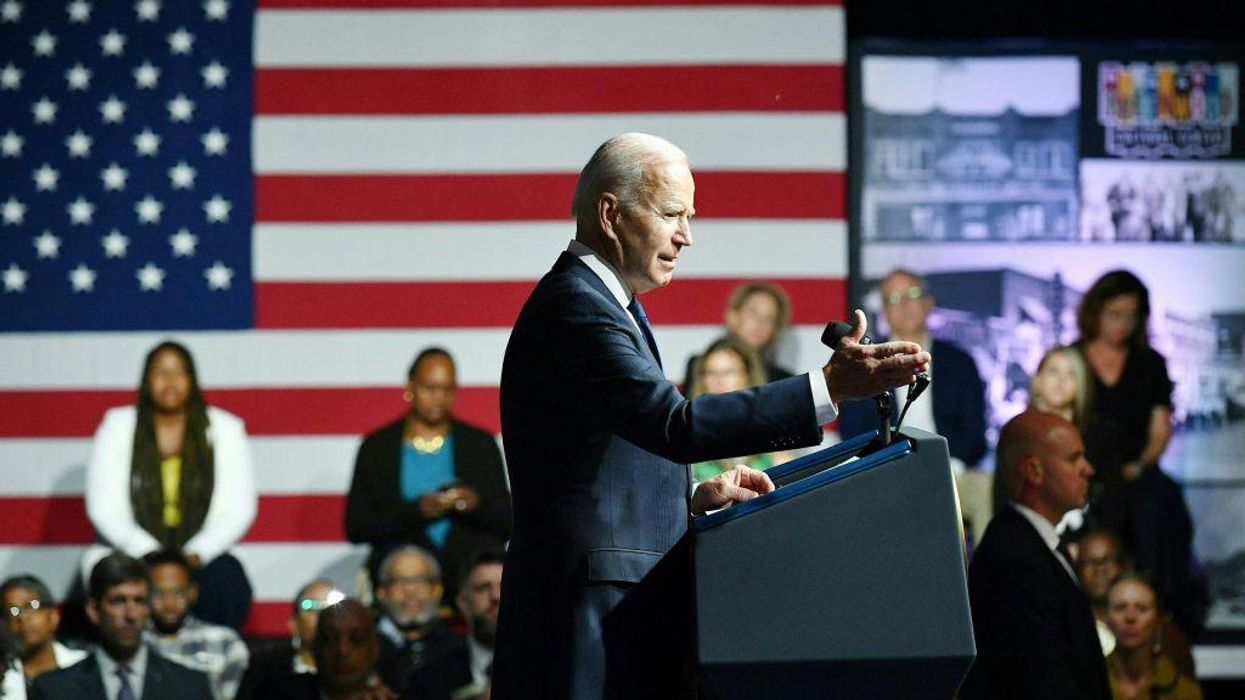
MANDEL NGAN/AFP via Getty Images

President Joe Biden bitterly disappointed some activists after he neglected to mention slavery reparations in a major speech he gave this week on racial violence in America and steps his administration is taking to reduce racial inequities. Biden also privately downplayed expectations on advancing reparations for slavery for black Americans through Congress, according to a report.
On Tuesday, the president gave an address in Tulsa, Oklahoma on the 100th anniversary of the race massacre where hundreds of black Americans were attacked and killed by a white mob in 1921. Biden said the senseless murder of 300 black people in Tulsa's Greenwood district was "an act of hate and domestic terrorism, with a through-line that exists today."
He announced several policy initiatives intended to reduce racial inequity, including investing in minority-owned businesses, regulating the housing market to combat racial discrimination, and urging Congress to pass his American Jobs Plan to spend more than $60 billion on programs designed to create jobs and support infrastructure in communities of color.
But the president omitted any mention of H.R. 40, a Democratic bill that would create a commission to study reparations for slavery, which surprised some Democrats. As a presidential candidate, Biden supported forming a reparations commission and promised to do so if elected president.
But according to Politico, Biden downplayed expectations for such a bill in a private meeting with members of the Congressional Black Caucus.
"He didn't disagree with what we're doing," said Rep. Brenda Lawrence (D-Mich.). "He did talk about his plate [being] full with trying to get the infrastructure bill passed and that he really wanted to make sure that he could get that through before he took on anything else."
Lawrence told Politico that Biden was concerned H.R. 40 would be held up in the United States Senate, where Senate Democrats would be forced to take a tough vote on a controversial issue and Republican filibuster threats would assuredly prevent the bill from passing.
Many Democrats praised Biden's speech, even with the omission of the reparations issue.
"He called out how through the years there have been members in elected office who were very public about their association or membership with [the] KKK," Rep. Cori Bush (D-Mo.). "He set up the scene in his speech to take us into what was happening at that time. And that was really powerful. I was so glad to hear it."
Rep. Hank Johnson (D-Ga.) called Biden's speech "meaningful" for Tulsa and the country. "Most of America had absolutely zero knowledge of the greatest single atrocity to Black people in this country. For him to use his pulpit to publicize what happened to them has to have been cathartic for them."
Oklahoma state Rep. Regina Goodwin, a descendent of survivors of the Tulsa massacre, was thankful Biden came to address the anniversary of the massacre, even if he didn't mention reparations.
"Look, it was not in the speech, but he was gracious enough to be here. He was gracious enough to take the steps. He was open to the conversation. A lot more than I can say for some folks," she said.
But others expressed displeasure with the president.
"I personally would have liked to hear the word reparations. I think that he was very strategic in the words that he used. He used the word repair," Nehemiah Frank, another descendant and founder of The Black Wall Street Times in Tulsa, told Politico. "If you want to pull the people together, you can't fully help Black people. That's how I feel about it. If you want to make Black folks happy, you're going to piss a lot of Americans off."
Dreisen Heath, a researcher for Human Rights Watch, told Politico she stormed off immediately after Biden's speech because she was frustrated with his neglect to mention reparations.
"This was not a celebration. People are mourning. Every day counts for these survivors. And I think that people just play games with Black people's lives too much. It's not enough to just come in and say words and reiterate the truthful narrative," Heath said.
Heath authored a report last year that said reparations for survivors of the Tulsa massacre should serve as a model for any larger reparations study or program initiated by the federal government.
"This is a huge national [and] global moment. Everybody is looking here. So why not start the process for the precedent? Why not make Tulsa a precedent for reparations nationally? Why not commit to signing H.R. 40 into law? Why not commit to establishing an H.R. 40 reparations commission if the legislative avenues fail?" Heath added.
Biden's private discussion with lawmakers appears to answer Heath's questions. The president wants Congress to put together a bipartisan deal on infrastructure because there's a chance it could actually pass. Reparations are not going to pass the U.S. Senate and haven't yet come up for a vote in the House of Representatives.
Additionally, as Politico notes, results from a poll conducted earlier this year found that only 38% of U.S. voters support forming a commission to study reparations for slavery. While 60% of Democrats may support the commission, the rest of the country still views the issue skeptically and Biden, a career politician, is sensitive to political realities, especially with the upcoming 2022 congressional elections in mind.